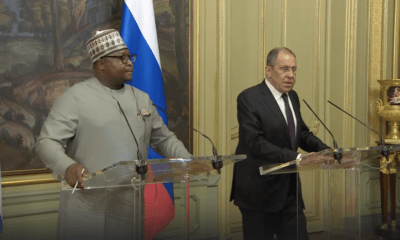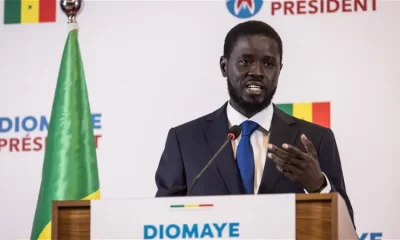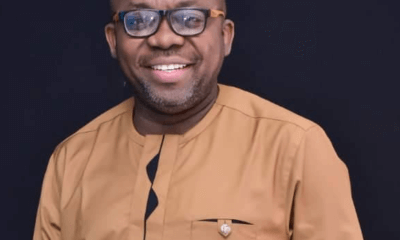Global Issues
A Flood Of Misinformation And Propaganda In Countries As The World Celebrate Press Freedom -By Caleb Onah
According to the World Press Freedom Index 2023, which evaluates the journalism environment in 180 countries and territories, released on World Press Freedom Day (May 3), the situation was rated “very serious” in 31 countries and “difficult” in 42 countries, “problematic” in 55 countries, and “Good or Satisfied” or “satisfactory” in 52 countries. In other words, the journalism environment is “bad” in 7 out of 10 countries and good in only 3 out of 10 countries.

2023 marks the 30th anniversary of World Press Freedom Day. Three decades have passed since it was proclaimed in 1993, during which time we have seen little progress toward achieving freedom of the press and freedom of speech around the world.
The growth of independent media in many countries and the rise of digital technology have facilitated the free flow of information in certain ways. However, media freedom, the safety of journalists, and freedom of expression are increasingly under attack, affecting the exercise of other human rights. The international community faces many crises: conflict and violence, persistent socioeconomic inequalities leading to migration, environmental crises, and challenges to the health and well-being of all.
People all over the world at the same time, online and offline disinformation and misinformation are rapidly increasing, with disastrous consequences for the institutions that underpin democracy, the rule of law, and human rights. The right to freedom of expression, enshrined in Article 19 of the Universal Declaration of Human Rights, is a prerequisite and impetus for the enjoyment of all other human rights. So this year’s special 30th anniversary of World Press Freedom Day is a call to refocus on press freedom, as well as independent, pluralistic, and diverse media, as the key to enjoying all other human rights.
This year, RSF shed light on the myriad forms of misinformation that overwhelm reliable information, a problem complicated by the rapid development of artificial intelligence. Reporters Without Borders (RSF) says journalism is being battered by increasingly sophisticated fake and propaganda practices, aided by artificial intelligence software and the failure to monitor companies.
The rankings were compiled by combining data on abuses against journalists and media professionals with hundreds of surveys sent to human rights activists, journalists, and academics. According to the 21st annual report published on the occasion of World Press Freedom Day, Norway and North Korea are the two countries with the best and worst press freedom, respectively.
According to the World Press Freedom Index 2023, which evaluates the journalism environment in 180 countries and territories, released on World Press Freedom Day (May 3), the situation was rated “very serious” in 31 countries and “difficult” in 42 countries, “problematic” in 55 countries, and “Good or Satisfied” or “satisfactory” in 52 countries. In other words, the journalism environment is “bad” in 7 out of 10 countries and good in only 3 out of 10 countries.
In some countries, using the World Freedom Index, RSF says traditional forms of political interference are gaining momentum in many countries. Highlighting the cases of Russia and India, he said about two-thirds of countries have politicians “regularly or permanently engaged in large-scale propaganda or disinformation campaigns.” and China is one of them. They are supported by a vast industry of disinformation. RSF recently assisted a group of investigative journalists working on Forbidden Stories, a project to expose Team Jorge, an Israeli company specializing in disinformation production.
The worst countries in the new ranking, with the exception of North Korea, are Vietnam, almost done with the hunt for freelance reporters and commentators, and China, being the biggest prison of journalists around the world. India has gone from just a “problem to very bad”, thanks to “media takeovers by oligarchs close to Prime Minister (Narendra) Modi”, and also in Turkey, where the government is “escalating”. Suppress journalists according to the government’s approach and election scheduled for May 14.
The United States dropped three places to 45th, in part due to the worsening security situation for journalists. The countries that went down the most were Haiti from 29 to 99, Senegal from 31 to 104, and Peru went down 33 places to 110. A big improvement was seen in Brazil, from 18 to 92 thanks to the departure of far-right president Jair Bolsonaro. RSF said the Middle East and North Africa remain the most dangerous regions for journalists, while Europe remains the safest, but attacks on German journalists have made the region a major threat. It’s more dangerous and needs to reduce by 5 spaces. Overall, the environment for journalists was rated poor in 70 percent of the 180 countries in the NGO’s annual ranking in just eight.
Above all else, to combat these critical situations and these threats, freedom of the press, the safety of journalists, and access to information take priority. May 3 shouldn’t be the only time we advocate for freedom of expression but beyond and should remind the government to keep its promise to free speech. A chance to respect the basic principles of freedom of speech and evaluates the state of press freedom in the world, I on a personal level express gratitude to the journalists and opinion givers who sacrificed themselves to protect the press from encroaching on the independence of the press and to fulfill their duties.



















